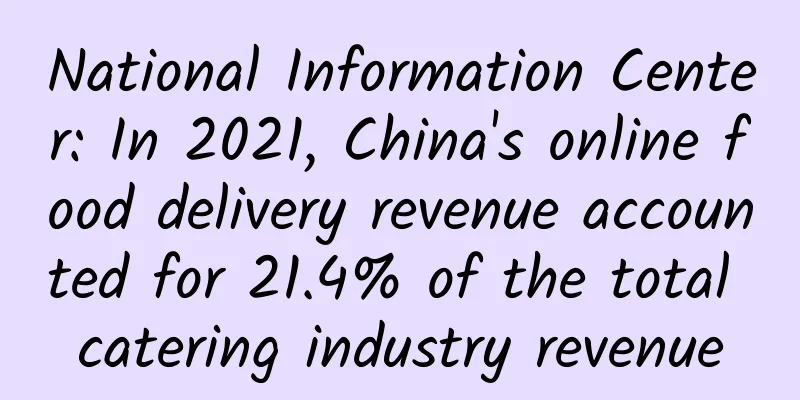National Information Center: In 2021, China's online food delivery revenue accounted for 21.4% of the total catering industry revenue

|
In the context of the COVID-19 pandemic, takeaways have replaced dine-in meals and become a more common part of people's lives. However, some businesses are still reluctant to join the food delivery platforms. Some choose to focus on operating offline stores for the sake of food quality, while others choose to use other delivery methods because they think the platform commission is too high. Industry insiders pointed out that the core issue of order volume and delivery quality still needs to be resolved. According to a report from the National Information Center, in 2021, online food delivery revenue accounted for 21.4% of the total revenue of the catering industry in my country. Among them, the transaction amount of a food delivery platform was 702.1 billion yuan, and the transaction volume of food delivery reached 14.4 billion. In addition to first-tier cities such as Beijing and Shanghai, the food delivery industry has gradually sunk to third- and fourth-tier cities. Not only will young people order food delivery, but middle-aged and elderly people are also beginning to gradually adapt to this lifestyle. Especially under the epidemic control situation, people are more likely to choose food delivery instead of dining in, and there was a situation where the food delivery guys were "in short supply". However, the reporter found that some merchants are still unwilling to join the food delivery platform, and some choose to quit after trying the platform. The reasons are that the platform commission is too high, there are too many uncontrollable factors in the delivery process, and a large amount of funds are required for maintenance, which are the main reasons for merchants to stay away. At the same time, new delivery models continue to emerge, and more and more businesses are improving their store reputation by improving the quality of dishes and choosing other delivery methods in order to obtain more long-term benefits. High commissions discourage businesses Mr. Wang, a barbecue restaurant owner in Qingdao, Shandong Province, has a monthly turnover of about 250,000 yuan. His staff has repeatedly proposed to put the food delivery platform online, but it has not been adopted. "To put it online, you have to pay a 20% commission, and if the number of orders increases, you will need to add more staff. It's not cost-effective after all the calculations." Mr. Wang said that some businesses have such concerns. It is understood that the takeaway platform charges a commission of 15% to 18% for large chain catering companies and 18% to 23% for small catering companies. In other words, for a 100 yuan order, the takeaway platform will charge 15 to 23 yuan, and the restaurant can only get about 80 yuan. The person in charge of a catering group in Qingdao said that the net profit of the catering industry is 20% to 30%. Merchants pay the delivery fees of the riders themselves, and then pay the commission of the platform. The actual profit may be only about 10%. "Many times, merchants make profits by running volume. Once the order volume is insufficient, it is very likely to lose money." The person in charge said that some merchants specializing in takeout will choose to reduce the cost of ingredients to increase profits in the face of the platform's commission and operating expenses. Mr. Wang told reporters that after joining the food delivery platform, not only do you have to pay commissions, but you also have to pay operating fees in order to increase sales and let more people see your store. "Some merchants will choose to prioritize food delivery orders, which will extend the waiting time for dine-in customers and reduce the offline store reviews. Instead of doing this, it is better to focus on offline business." In addition to high commissions, uncontrollable factors in the delivery process are also an important reason why merchants are reluctant to join the food delivery platform. A Cantonese restaurant in Qingdao has just joined the platform. Due to lack of experience, the restaurant started preparing the food immediately after the customer placed the order, but due to bad weather, there were no riders to take the order in time. "In the end, the food was cold, but the takeaway was still in the store." The person in charge, Mr. Shen, said helplessly that the bad reviews caused by the delivery riders' delayed delivery and spilled soup would directly affect the store's reputation, so some merchants who want to be quality refused to join the platform. "The strict management mechanism and lack of backend services of food delivery platforms have caused inconvenience to some businesses." The owner of a Japanese restaurant in Qingdao told reporters that after the outbreak, food delivery platforms have been very strict in reviewing online businesses. If they do not have an online business license, they must sign an exclusive agreement with the platform. Not only that, the efficiency of the platform in solving problems is also very low, and some operational issues often take 2 to 3 days to respond. Some merchants choose other delivery methods It is understood that the takeaway commission is mainly composed of three parts: platform usage fee, technical service fee and delivery service fee. The platform usage fee is similar to the cost of offline land rent. The takeaway platform invests a lot of money every year to increase technology research and development to ensure the smooth operation of transactions between merchants and customers. Relevant data shows that the research and development expenditure of a takeaway platform in 2018 was 7.07 billion yuan, nearly double the 3.65 billion yuan in 2017. After the outbreak of the epidemic in 2020, some platforms implemented a phased commission exemption policy for all in-store catering partners and life service merchants across the country; other platforms provided merchants with services such as commission reduction and exemption, and annual fee extension. Faced with such measures, many businesses believe that it is a drop in the bucket. In order to reduce passivity and ensure the quality of delivery, many businesses "hide" from food delivery platforms and choose other delivery methods. The reporter found that some merchants choose to go online on the platform, but complete the delivery process by themselves, with a commission of 3% to 10%, which can increase profits by at least 10% per month; many merchants choose to hire full-time delivery employees, with a monthly salary of 4,000 yuan plus commission, and can also take into account in-store dine-in services; in order to alleviate peak dining times, some merchants sign contracts with the platform, mainly delivering by themselves, supplemented by platform delivery. Mr. Song, who specializes in seafood takeout, said that they deliver takeout by cooperating with delivery companies, and the delivery companies directly arrange personnel for delivery. This can not only ensure the operation of the store, but also ensure the delivery speed and food safety. Businesses around the campus prefer the "campus takeaway" delivery model. They provide meal pickup services for college students during peak meal times, and can deliver multiple orders at once, charging 2 to 5 yuan per order depending on the distance. Not only is it more convenient and efficient, but businesses don't have to pay for delivery. Order volume and delivery quality issues still need to be resolved In response to the high commissions generally reported by merchants, a catering group called on food delivery platforms to substantially reduce commissions. The catering group also proposed to reach a strategic cooperation with Tencent WeChat and SF Express to assist catering brands in launching food delivery mini-programs, increase private domain traffic orders, and reduce commission expenses. The Guangdong Catering Services Industry Association has previously reported to the Provincial Department of Commerce and negotiated with food delivery platforms, striving for the platforms to continue to increase commission reductions based on provincial conditions and to ensure normal profits for merchants. At present, Beijing is planning to issue the "Regulations on Catering Safety Management for Online Catering Services". There will be unified standards for the production, packaging and delivery of takeout food in the city. In addition to requiring that the quality of takeout food should not be "treated differently" from dine-in food, takeout food that has been stored for more than 2 hours will no longer be delivered for meals, and packaging seals that "cannot be restored after opening" or disposable sealed outer packaging bags must be used. The increasingly standardized industry standards and diversified delivery methods are forcing the traditional food delivery industry to improve its services. A relevant person in charge of a food delivery platform said that helping the industry cannot rely solely on simply reducing commissions. If the core problem of order volume and delivery quality is not solved, no matter how much reduction or exemption is given, it will only be temporary. "The platform should help merchants occupy more market share by strengthening online operations, optimizing platform supply capabilities, and strictly enforcing delivery service standards. This is also the most effective way to improve the platform's market stickiness and core competitiveness." The person in charge said. From Workers Daily |
<<: Will COVID-19 have any "aftereffects"? Experts explain and tell you!
>>: How people explore and build social connections on online platforms
Recommend
Bad habits cause premature aging of the cervical spine. Symptoms and prevention of cervical spondylosis. How to prevent chronic cervical injury?
Due to long-term chronic strain, the age of onset...
What is the reason for excessive vaginal discharge four months after giving birth?
Many women will experience an increase in leucorr...
Why does the little girl have blackheads on her nose?
We have discovered that if your skin is more oily...
Breast pain every month
Breast pain occurs every month mainly due to mens...
Pictures of cervical opening after normal delivery
Nowadays, most women prefer to give birth through...
Unpleasant smell in underwear after pregnancy
After pregnancy, if your underwear has an odor, y...
Will my belly get bigger when I am 2 months pregnant?
Pregnancy is a happy thing for the whole family. ...
Normal ovulation basal body temperature chart
Because after ovulation, a woman's uterus and...
How to relieve menstrual migraine
Menstrual period is a special stage for women. Du...
Understand in one article why the elderly are prone to frequent urination?
Frequent urination is one of the common symptoms ...
Is a 24-day menstrual cycle normal?
Menstruation is our good friend who comes on time...
What to do if pregnant women have small intestine fire
What we call small intestine fire is actually acu...
What's the matter with the tofu-like vaginal discharge?
It is quite common for women to have dreg-like di...
Scientifically identify clubfoot, rehabilitation can help you!
In daily rehabilitation work, we always see paren...
Why do we get pubic lice?
Pubic lice are a relatively common parasite that ...









